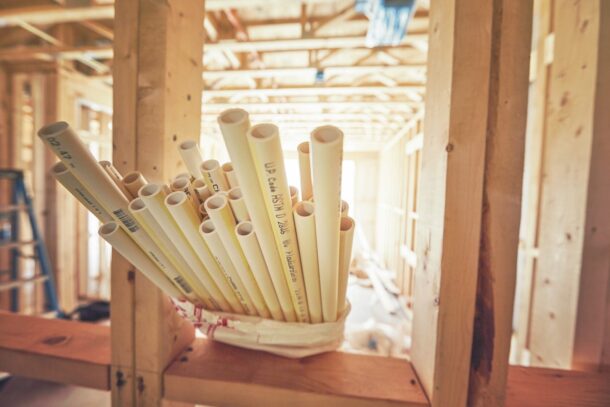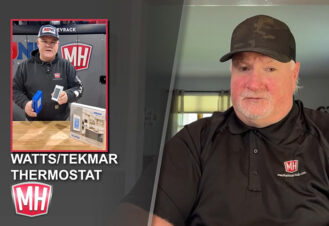By Jonathan Simon
Most homeowners don’t think about the plumbing materials in their homes until a problem occurs. Yet, plumbing materials play a significant role in their day-to-day quality of life, especially when the system doesn’t deliver on their expectations.
Some plumbing systems can contribute to issues like poor water pressure and water quality. Then, of course, there are the reliability problems that can arise when the plumbing system proves incompatible with local water conditions, leading to failures and water damage that can turn a homeowner’s life upside down.
So, while homeowners don’t spend much time thinking about plumbing materials, plumbers should. Here are four ways that you can protect your customers thanks to the performance of CPVC.

Water Pressure
Low water pressure can be frustrating for homeowners every time they shower, and the design of the plumbing system could be a contributing factor.
Plumbing systems using insert fittings where the fitting goes into the pipe will reduce the system’s diameter at the fitting, restricting flow and creating a much larger pressure loss than occurs with systems where the pipe is inserted into the fitting, such as CPVC and copper. Even expansion fittings, which have the largest internal diameter of the insert fittings, can cause up to 7x more pressure loss in the system compared to a CPVC or copper fitting.
Insert fittings can also create turbulent zones in the pipe as water jets out of the restriction created by the fitting. These higher-velocity zones may require that the design velocity of the system be reduced to remain within manufacturer specifications.
Plumbers can compensate for the issues created by insert fittings by upsizing piping, but that adds significant cost to projects. Using larger pipe to slow down the water and reduce pressure drop can also pose challenges in areas that need to comply with water and energy efficiency standards. By minimizing pressure drop across the system, CPVC helps preserve water pressure at fixtures.
Water Quality
No plumbing system can improve water quality, but the choice of materials can minimize the risk of various sources of contamination.
One of those risks is biofilm growth. Biofilm that forms inside residential plumbing systems can contain bacteria such as E. coli, coliforms and legionella. The susceptibility of a particular material to biofilm is called its biofilm formation potential and varies across materials. Independent research has found that CPVC has a lower biofilm formation potential than other plastic plumbing systems and is consistently among the lowest of plumbing systems tested.
Permeation and leaching also present risks to residential water systems. Materials vulnerable to permeation can allow dangerous chemicals that come in contact with the outside of the pipe to enter the water supply. The U.S. EPA, in their study on Permeation and Leaching, found that vinyls such as CPVC are virtually impermeable at low levels of exposure and that polyolefin plastic plumbing materials accounted for more than three-quarters of the documented permeation incidents in the United States.
NSF 61 is the industry standard for protecting against unsafe leaching of chemicals from plumbing materials into the water supply. FlowGuard Gold CPVC is certified to NSF 61 under all water conditions. Copper and some PEX brands have limitations on their NSF 61 listings.
By reducing the risks from biofilm formation, permeation and leaching, plumbers play an important and underappreciated role in protecting the health of their customers. And while homeowners may never fully appreciate that role, they could notice the difference in water quality when materials other than CPVC are used. According to research from Virginia Tech, CPVC has the lowest impact on drinking water taste and odor of any residential plumbing material.
Reliability
In addition to good pressure and water quality, homeowners want a plumbing system they don’t have to worry about. If there’s one thing more frustrating than a water leak, it’s having a second leak soon after the damage from the first has been repaired. That was the experience of the Jackson family in Battle Ground, Washington. They had multiple plumbing system failures, one after the other, until an expert finally diagnosed the root cause of the problem as incompatibility between the plumbing material chosen for their ten-year-old home and local water conditions. When the home was repiped with CPVC, the problems disappeared.
CPVC is the only residential plumbing material that is naturally immune to chlorinated drinking water. As municipalities strive to maintain water safety through treatment methods that produce higher oxidative reduction potential in the water they supply, this is more important than ever. CPVC can perform reliably in water conditions and at temperatures, pressures and velocities that could lead to degradation and early failure in other plastic or metal plumbing systems.
Sustainability
For homeowners that prioritize the sustainability of building materials, CPVC is a very attractive choice. Based on comparisons using the National Institute of Standards (NIST) BEES software, FlowGuard Gold CPVC requires less energy to manufacture, has lower embodied energy and results in fewer emissions over its service life than PEX and copper. CPVC is also recyclable through proper centers.
In addition, FlowGuard Gold CPVC is the only residential plumbing system certified by Home Innovation Labs National Green Building Standard (NGBS) and has a lifecycle assessment to enable the material to contribute to LEED certification.
Making the Right Choice
If you’re looking to give your customers the water quality, pressure, reliability and sustainability they are looking for, CPVC is the right choice. And CPVC doesn’t just deliver benefits to homeowners. Plumbers experience lower material costs, faster installation and excellent support from leading manufacturers. To learn more, visit flowguardgold.com/plumber-resources.
Jonathan Simon is the North American residential plumbing manager for Lubrizol Advanced Materials. Half of the world’s consumers use at least one product containing a Lubrizol ingredient. Advanced materials products create and/or improve the performance of our customers’ products and enable unique performance attributes. For 60 years, FlowGuard Gold Pipe and Fittings have provided reliable hot and cold water plumbing systems to residential and commercial buildings.




Join the conversation: